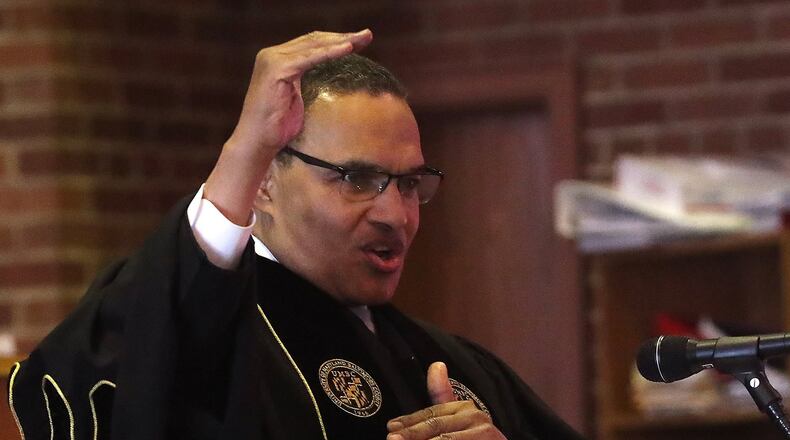Hrabowski — an educator, author and mathematician —was delighted to find 6-year-old Mayeddin Hasheem and his 5-year-old sister Aahlyon, students at Kenwood Elementary, practicing math problems on paper tablets.
At their grandmother’s encouragement, instead of a day off school to play, mom Candace Cumberland brought them to further their education and appreciate the sacrifices of King and others.
“This is the best way I can start my job,” Hrabowski, the president at the University of Maryland, Baltimore County, said as he asked the children money-related math problems, which each answered correctly and about their dreams. “I’ll be thinking about the two of you when I speak.”
PHOTOS: Annual Martin Luther King Luncheon
Meeting children prior to his messages was a common King practice, according to Hrabowski, who was jailed in the early 1960s as a 12-year-old child in Birmingham, Ala., following a civil rights march, motivated by King’s message.
The program, “Holding Fast to Dreams: A 50-Year Experiment in Higher Education” found Hrabowski, wearing a Wittenberg t-shirt under his doctoral robe, recounting his early involvement in activism for a better life as well as the advantages of higher education, the importance of teaching children and how everyone can help.
“Whenever Dr. King came to our church, he acknowledged the children. It was to tell them they matter,” he said. “(Mayeddin and Aahlyon) gave me goosebumps because they were doing math. The key is their mother working with them.
“The way we interact will shape who we are. Our dreams and values will shape who we are. The difference between the haves and have-nots is education. What do we want people to be able to do?”
At several points, Hrabowski called upon the many students to answer his questions, as well as challenge them, reminding them they are privileged and this is the most privileged country on Earth.
PHOTOS: 6-acre lot secludes luxury home on market near Urbana
He encouraged the thirst for knowledge, relaying that even though he’s accomplished in many areas, Hrabowski recently began learning French, which some of the students at his school thought he was too old to do, a notion he dismisses.
“The point I’m making is you never stop learning. If you learn a language, you learn the culture,” Hrabowski said, asking if there were others studying French and addressing them in the language.
Hrabowski related his experiences of marching for civil rights, his parents’ reluctance and blessing for him to do so and how it shaped his life.
He recalled the church bombing that killed four little girls, captured in an acclaimed Spike Lee documentary that Hrabowski appeared in, attending the funeral and seeing change.
“Even children can have impact in the world,” he said. “For the first time, I saw whites in my church. It was courageous for them to come out, and I realized people could care about children of any race.”
Hrabowski emphasized the importance of education at basic and higher levels, reasoning that if you can get a child to read, they can learn math, science, chemistry and other subjects.
Education especially makes a difference in voting in this country, telling the story of his grandmother winning that privilege at age 70 after years of being denied.
“My message to you is people take their rights to vote. We must have the courage to vote for this country, for the children.”
About the Author
